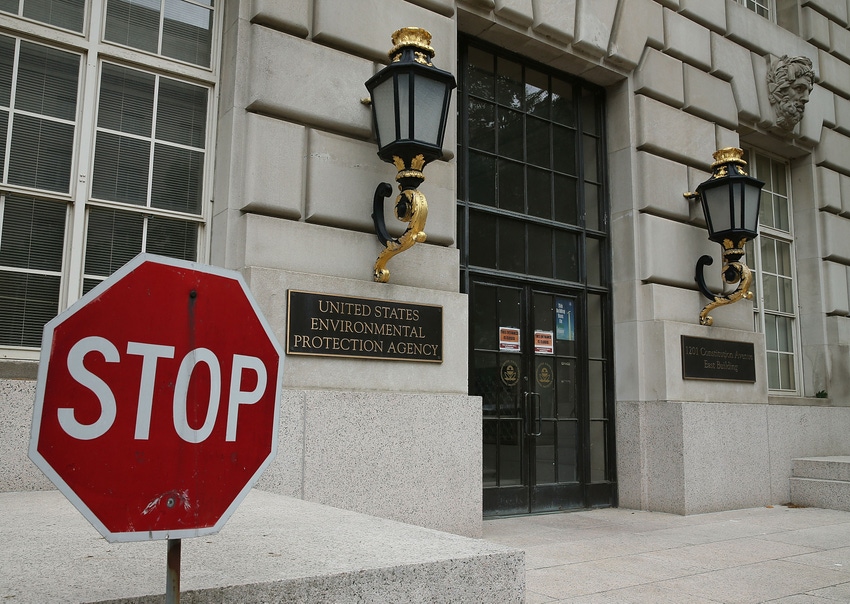EPA actions on RFS exemptions continue to come under fire.

This fall, farmers and the ethanol industry have faced an unprecedented amount of political uncertainty when it comes to the Trump Administration’s handling of the Renewable Fuel Standard (RFS) and the small refinery exemptions offered to “small” refineries that may not be able to blend mandated levels of biofuels. Farmers have cried foul on the billions of gallons offered in waiver requests, while the Environmental Protection Agency continues to play bait and switch with the ethanol industry.
On Oct. 4, the White House seemingly had struck a deal to appease the ethanol industry, which was getting louder about its displeasure with President Donald Trump. He promised that the 15 billion gal. mandate would indeed be 15 billion gal. – and could even go as high as 16 billion (as he mentioned in a news briefing with producers in the room).
Just 11 days later, the proposal from EPA did not offer the promised reallocation of lost demand. The ethanol industry felt sucker punched by the EPA -- and rightfully so. As it turns out, the U.S. Department of Agriculture warned EPA in final review that EPA’s draft version of the new biofuel fix “violated the spirit of a deal brokered by President Donald Trump,” according to a recent report on the final review. Those documents can be found here.
Interestingly, in a Cabinet-level meeting the President held on Oct. 21, Trump seemed more concerned with small refineries than with farmers.
In speaking to EPA Administrator Andrew Wheeler, Trump said the deal is going to be “terrific for the small refineries” and added, “They’ve been hurt for a long time, and we gave them waivers for this year. … Make sure the small refineries are happy.”
Agriculture Secretary Sonny Perdue said to the President: “You’ve also balanced up the smaller refinery waivers with the farmers and RFS, and once they full understand what you’ve done here, they’ll be fine, and – as they see it implemented.”
Trump said farmers deserve to be happy, but that’s not how Primghar, Iowa, corn farmer Daryl Haack, a member of the Iowa Corn Industrial Usage & U.S. Production committee, said he feels. “Corn and soybean farmers are angry. We understand exactly what the EPA did. We are not fine, and we are definitely not happy. The EPA pulled a bait-and-switch with the plan President Trump promised on Oct. 4," he said.
“We need those gallons restored – the actual gallons waived, not a bogus estimate. The demand destruction is real. The fix should be, too. All we are asking for is what the President promised: a plan that would restore certainty so plants can reopen and farmers can rebuild after three years of lost markets,” Haack said.
The recently proposed rule again put the power of allocating the RFS in the hands of EPA. “Instead of standing by President Trump’s transparent and accountable deal, EPA is proposing to use heretofore secret [U.S. Department of Energy] DOE recommendations that EPA doesn’t have to follow. That means there is no guarantee that RFS exemptions will be accounted for in the RFS,” Iowa Renewable Fuels Assn. executive director Monte Shaw said.
As Shaw said following the Oct. 11 rule release, it is unreasonable to put faith in EPA to fix the small refinery exemption problem when it was the one that created the crisis in the first place.
On both the litigation and legislative fronts, actions are seeking to hold EPA accountable.
The House energy and commerce subcommittee on the environment and climate change plans a hearing for Oct. 29 that will review the nation’s biofuel blending requirements, specifically EPA’s granting of small refinery exemption waivers and the Administration’s plans to reallocate those waived gallons of biofuel. The committee will also consider the Renewable Fuel Standard Integrity Act of 2019, a bill that provides certainty to the biofuel industry by setting an annual deadline for small refinery exemption applications and bringing transparency to the process. The bill was introduced by Rep. Dusty Johnson (R., S.D.) and House Agriculture Committee chairman Collin Peterson (D., Minn.).
“Our farmers and rural communities rely on the RFS for their economic viability, and EPA’s actions have done nothing but provide uncertainty and the potential for economic ruin,” Peterson said in welcoming the consideration of his bill.
A coalition of renewable fuel and agricultural trade organizations filed a petition Tuesday afternoon with the Court of Appeals for the District of Columbia Circuit challenging the process by which EPA exempted certain unknown small refineries from their respective RFS obligations for 2018. The groups include the American Coalition for Ethanol, Growth Energy, National Biodiesel Board, National Corn Growers Assn., National Farmers Union and Renewable Fuels Assn.
Unlike previous years, EPA’s entire decision document was only two pages long, the coalition noted in its petition. In these short two pages, EPA purported to resolve 36 pending petitions for disproportionate economic hardship exemptions — a decision that exempted small refineries from having to blend almost 1.5 billion gal. of renewable fuel.
The brief document does not reveal any details and contains only the most bare-bones reasoning for EPA’s decision. Further, the decision did not transparently address whether any of the small refineries were eligible to receive extensions of their exemptions and did not include an analysis of "disproportionate economic hardship" as the statute envisions, the groups noted.
“Even as the Trump Administration indicates it is taking steps to account for future small refinery exemptions, the coalition remains concerned that EPA’s abuse of the small refinery exemption program diverges from the spirit and letter of the Clean Air Act,” the coalition stated. “From a substantive and procedural perspective, this is not the way for a federal agency to make such a momentous decision.”
About the Author(s)
You May Also Like




.png?width=300&auto=webp&quality=80&disable=upscale)
